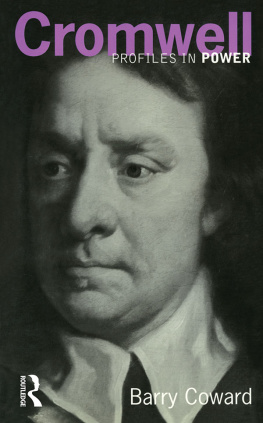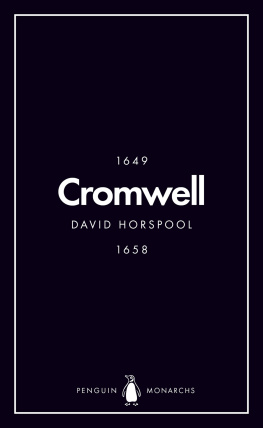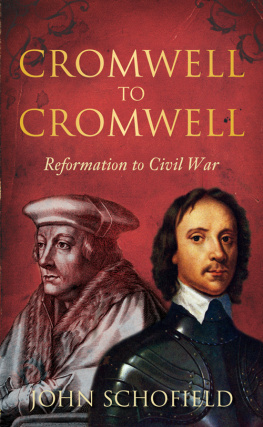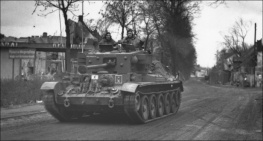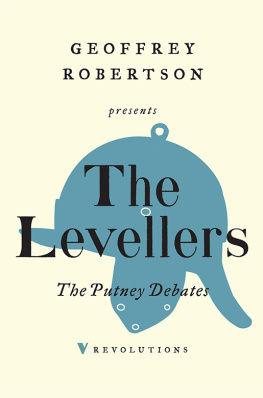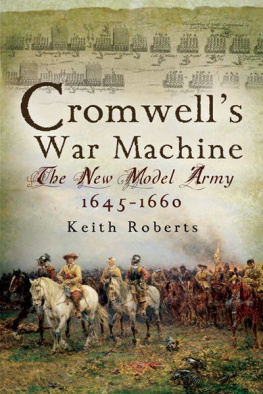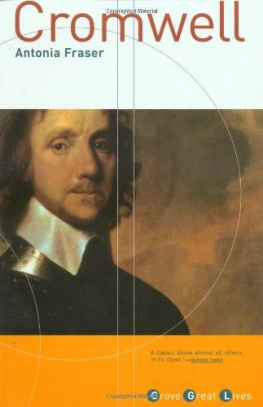First published 1991 by Pearson Education Limited
Published 2013 by Routledge
2 Park Square, Milton Park, Abingdon, Oxon OX14 4RN
711 Third Avenue, New York, NY 10017, USA
Routledge is an imprint of the Taylor & Francis Group, an informa business
Copyright 1991, Taylor & Francis.
The right of Barry Coward to be identified as author of this Work has been asserted by him in accordance with the Copyright, Designs and Patents Act 1988.
All rights reserved. No part of this book may be reprinted or reproduced or utilised in any form or by any electronic, mechanical, or other means, now known or hereafter invented, including photocopying and recording, or in any information storage or retrieval system, without permission in writing from the publishers.
Notices
Knowledge and best practice in this field are constantly changing. As new research and experience broaden our understanding, changes in research methods, professional practices, or medical treatment may become necessary.
Practitioners and researchers must always rely on their own experience and knowledge in evaluating and using any information, methods, compounds, or experiments described herein. In using such information or methods they should be mindful of their own safety and the safety of others, including parties for whom they have a professional responsibility.
To the fullest extent of the law, neither the Publisher nor the authors, contributors, or editors, assume any liability for any injury and/or damage to persons or property as a matter of products liability, negligence or otherwise, or from any use or operation of any methods, products, instructions, or ideas contained in the material herein.
ISBN 13: 978-0-582-43751-7 (pbk)
British Library Cataloguing-in-Publication Data
A catalogue record for this book can be obtained from the British Library
Library of Congress Cataloging-in-Publication Data
A catalog record for this book can be obtained from the Library of Congress
.......
In the Notes and References at the end of each chapter the following abbreviations are used:
Abbott: W.C. Abbott (ed.), The Writings and Speeches of Oliver Cromwell (4 vols, Cambridge. Mass., 193747)
Original Letters: J. Nickolls (ed.), Original Letters and Papers of State Addressed to Oliver Cromwelletc. (1843)
TSP : Thomas Birch (ed.), A Collection of the State Papers of John Thurloe. (7 vols, 1742)
Of the many people who have helped me, wittingly and unwittingly, in writing this book, I would like to thank particularly Professor Anthony Fletcher, of the University of Durham, who read and made valuable comments on a draft of the first seven chapters.
.......
Is another study of Oliver Cromwell needed? has been a question I have been asked by some who have learned that I was writing this book. In one sense this is not a surprising question, as countless biographies of Cromwell exist. There are, however, two answers. The first is that this book is not a biography. Following the editorial guidelines of the series of which it is a part, it is a study of Cromwell as a political figure and of the historical problems associated with his exercise of power. Furthermore, many of these historical problems have never been satisfactorily answered. I make no claim that this book provides definitive answers to them. Indeed there have been times during its composition when my puzzlement about the man has increased, along with the conviction that the search for truths about so complex and controversial a character as Oliver Cromwell is fraught with more obstacles than historians usually face in the normal course of their work. In these circumstances my aim is merely to suggest answers to some of the problems raised by Cromwells political career.
These problems are, of course, legion. What conclusions about Cromwells political aims and ambitions can be drawn from the handful of evidence that survives about the first forty-one years of his life? How important a member of the parliamentary opposition to Charles I was he in the packed, fast-moving months between the calling of the Long Parliament in November 1640 and the outbreak of the Civil War in August 1642? What drove him to brush aside the risks of being charged with treason by seizing money and plate bound from Cambridge to the king in August 1642 before the Civil War had officially begun? Given Cromwells lack of any previous military experience, how was it that he gained an extraordinarily high reputation as a cavalry commander in the Civil War? How well-deserved is that reputation? What was his part in the politicisation of the victorious parliamentary New Model Army after the war? Did he (as has sometimes been alleged) initiate the successful attempt by Cornet Joyce in June 1647 to capture the king from his parliamentary guards at Holmby House, which propelled the army into adopting a new political role? How seriously did Cromwell and others pursue negotiations with the king in 1647? What were Cromwells aims at the famous Putney Debates in the army council at the end of the year, and did he engineer the kings escape from army custody in November 1647 in order to stifle the growing radical influence of the Levellers in the army ranks? What pushed Cromwell in the last days of 1648 to ditch any hopes he had of achieving a settlement with Charles I and to become one of the most fervent advocates of bringing the king to trial and execution?
His career after the establishment of the English Republic in 1649 is littered with (if anything) even more intractable problems that centre around explaining Cromwells apparent ideological schizophrenia: his phases of cautious moderation that were interrupted by explosive and outrageous outbursts of radical political activism. Why, after his return to parliament after crushing opposition to the new republic in Ireland and Scotland between 1649 and 1651, did he suddenly abandon months of hard work attempting to prevent the growth of renewed division between MPs and the army and, on 20 April 1653, backed by military force, angrily dissolve parliament? What were his intentions in then calling a nominated assembly, the so-called Barebones Parliament? Did he intend it to be a permanent rule of godly saints? Why did he acquiesce in the political plot that brought about the end of Barebones Parliament and why did he agree to being installed as Protector of the Commonwealth of England, Ireland and Scotland in December 1653? How seriously did he work for a return to normal modes of government by a single person and parliaments? Why did the two parliaments he called during his Protectorate both end with sudden outbursts of Cromwellian anger and frustration? What caused him to agree to the appointment of major-generals to exercise power in English provinces in the middle years of his Protectorate? Why did he accept a new parliamentary constitution and yet turn down the offer to become King Oliver I in 1657? Was his Protectorate a military dictatorship led by a man driven by vaulting ambition? As will be seen, the Cromwellian Protectorate was not simply a military dictatorship, and there is little doubt that Cromwell was driven throughout his career from the early 1640s by a growing and overwhelming desire to achieve much more than personal gain. What exactly he wanted to do with the power he held is, however, the most difficult, unresolved question of them all.


